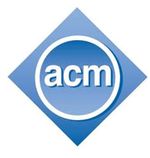ACM
| Type: | Association |
| Industry: | Computing |
| Founded: | 1947 |
| Headquarters: | New York |
| Country: | USA |
| Website: | www.acm.org |
| Key People | |
| Alain Chesnais, President Barbara G. Ryder, Vice President Alexander L. Wolf, Secretary/Treasurer John R. White, Executive Director & CEO | |
ACM (Association for Computing Machinery) is an academic society dedicated to the advancement of the computing profession. It has a large membership, with over 96,000 members worldwide. The association serves its members and other professionals in computer sciences and its applications by providing high quality publications, conducting conferences, career resources, and through its digital library.[1]
History
ACM was founded by in 1947 as Eastern Association for Computing Machinery during a meeting at Columbia University in New York. It was established due to the growing interest in computers during that time. A series of meetings and symposiums were held in different Universities regarding electronic computing machinery. In 1948, it was officially called Association of Computing Machinery and its constitution was instituted via membership approval in 1949.
In 1961, ACM established its first student chapter at the University of Louisiana at Lafayette.
In 1966, ACM created the AM Turing Award in recognition to the the great contributions of British Mathematician Alan M. Turing in the computing profession. The AM Turing Award is awarded annually to individuals whose work has a great impact in the lifetime development of computer science. This award is regarded as the Nobel Prize for Computer Science.[2]
Also in 1966, the Associations Code of Ethics and Guidelines for Professional Conduct in Information Processing was first implemented; expanded in 1972, it was again revised in 1992 and it is the current Code of Ethics and Professional Conduct of ACM. In 1994, ACM and the Institute of Electrical and Electronics Engineers (IEEE) collaborated to create the code of ethics and professional practices for Software Engineers, which was finalized in 1999.[3]
Since its establishment, one of the primary concerns of ACM is ethical issues in computing and information technology. The association is dedicated to promoting responsible practices among professionals in the computing industry.
Activities
The association sponsors more than 150 conferences per year about computer graphics (SIGGRAPH); data communications (SIGCOMM); mobile computing (SIGMOBILE); knowledge discovery and data mining (KDD);software engineering (SIGSOFT); high performance computing (SC); human computer interaction (SIGCHI); object-oriented programming (OOPSLA)freedom and privacy (CFP) among others. ACM also promotes development for the computing profession through its publications, educational programs, public awareness activities and special interest groups.
It publishes and distributes more than 40 publications of original research from the leading experts in computing and information technology. Its digital library has a collection of journals, magazines and peer-reviewed articles dating back to 1950. Its Special Interests Groups are working and coordinating activities, working on both the local and global scale, to address the pressing issues confronting professionals in the field of computing and information technology.
ACM also recognizes professionals and their lifetime contributions in the field of computer science and its application through different awards such as the AM Turing Award, ACM-Infosys Foundation Award in the Computing Sciences, Grace Murray Hopper Award, Paris Kanellakis Theory and Practice Award, Karl V. Karlstrom Outstanding Educator Award and the Allen Newell Award.[4]
ACM and ICANN
The ACM Internet Governance Committee (ACM-IGF) has been active in sharing its views, comments and recommendation to the Policy Issues of the Internet Corporation for Assigned Names and Numbers. In 1999, ACM-IGF submitted a compromise proposal to ICANN regarding the creation of Non-Commercial Users Constituency (NCUC) under the then Domain Name Supporting Organization, now GNSO, to clarify the goals and objectives of the Constituency. It proposed that the NCUC should not be a catch for all organization and it must be limited only to organizations that are non-profit and provide welfare and community services, promote arts and culture, and are engaged in scientific research and human rights. In addition ACM-IGF also emphasized that the Constituency is a poor representative for individual domain name holders and they should have their own Constituency to properly represent their views and needs to ICANN.[5]
During the same year, ACM-IGF also submitted a petition for ICANN to return the cybersquatting definition and alternative dispute resolution procedures to the DNSO Names Council for additional work on substance and procedure to create a well-balanced and widely supported Cybersquatting Policy.[6]
In 2002, the ACM Public Policy sent a letter to Dr. Vinton Cerf, then Chairman of ICANN, asking the leadership of the internet governing body to "scale down its size and scope of operations to focus on its core function of coordinating Internet resources on a technical level".[7]
